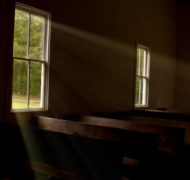The Covenantal Hope (Ezekiel 35-48)
Bible Commentary / Produced by TOW Project
Ezekiel's theology of work would be incomplete if not placed in the full context of future restoration alluded to throughout the book. The covenant between God and Israel seems broken by Israel's failure to fulfill its obligations. But God will restore Israel and fulfill his promises when Israel returns to him. This fulfillment is climactically expressed in the restoration oracles and new temple section of the book (chapters 35-48). Here the reader sees a more thorough picture of the future that the faithful exile is to herald in the present through righteous living and corporate responsibility.
The promise of a Davidic shepherd in the future age of restoration is inherent to God's "covenant of peace" with Israel (Ezek. 34:25) and is called an "everlasting covenant" (Ezek. 37:24-26). Ezekiel looks forward to a day when this royal shepherd-king will usher in God's promised blessing for Israel and, more important, lead her into fulfilling her calling as "God's people."[1] Ezekiel is clear that God grants this by giving them an undivided heart and a new spirit to fulfill his laws as he commanded in Ezek. 18:31 (see also Ezek. 11:19-20; 36:26-28; 37:14; 39:29). God's people will be fully equipped for doing his will and will be sanctified by the presence of God in the new sanctuary in their midst (Ezek. 37:28). Ezekiel spends nine chapters mapping out this new temple for the day of restoration and the worship required (Ezek. 40-48). In light of the close parallels between Ezekiel 38-48 and Revelation 20-22, we may wonder if Ezekiel's vision anticipates a literal restoration of the temple, or whether this points to the greater reality of the New Jerusalem in which there is no temple "for its temple are the Lord God the Almighty and the lamb" (Revelation 21:22).
As Christians, we place our trust in the ultimate shepherding of Christ. It is he who not only fulfilled individual righteousness, but also took full corporate responsibility for humanity by shedding his own blood on our behalf. By Jesus' death and resurrection, Ezekiel's day of covenant fulfillment has dawned for the Christian. But the day is not done, and the covenant is not yet fully consummated. Ezekiel teaches us that when we are called to the workplace, we are called to righteous activity in exile as we embrace the challenges inherent in awaiting the consummation of God's kingdom. God requires a lifestyle of individual righteousness and corporate responsibility indicative of the future fulfillment of the covenant. By following in Jesus' footsteps, we can begin to live out God's future restoration in the workplace today.





